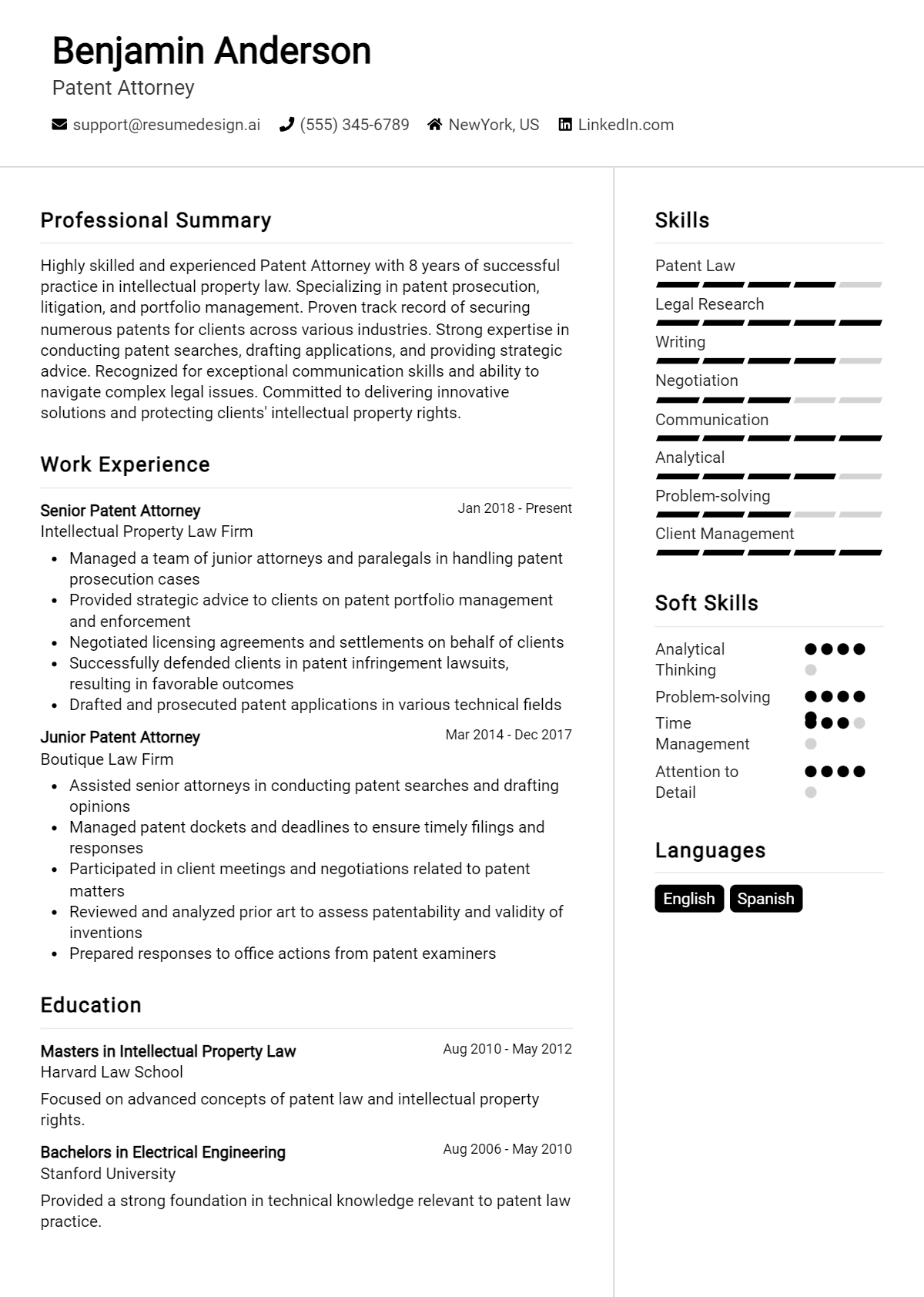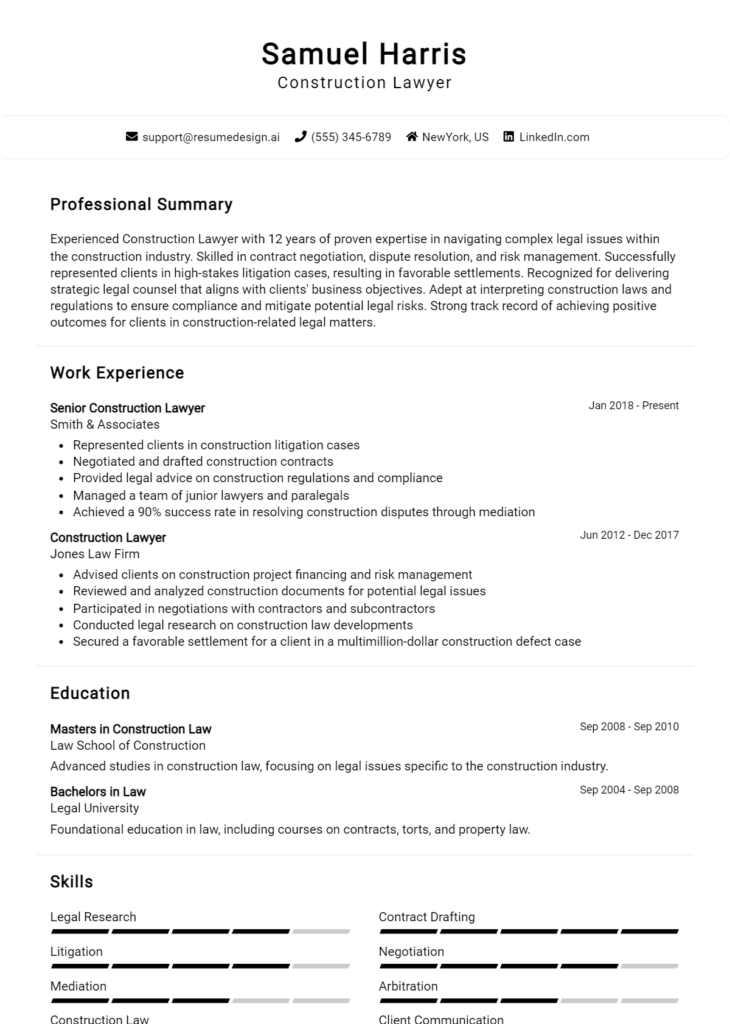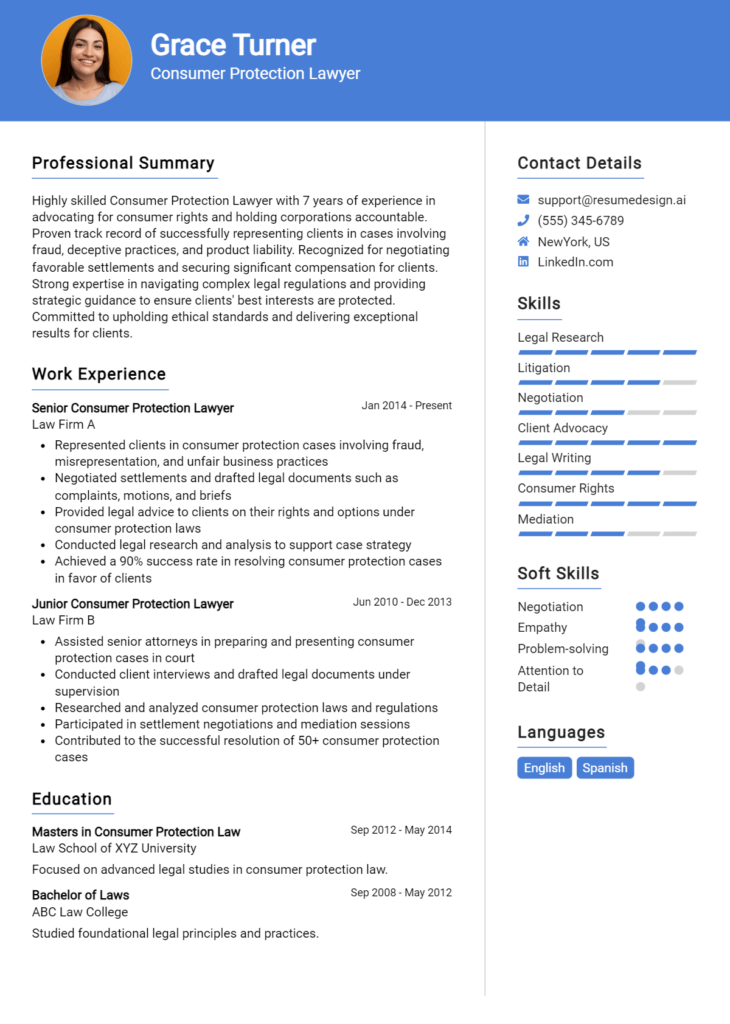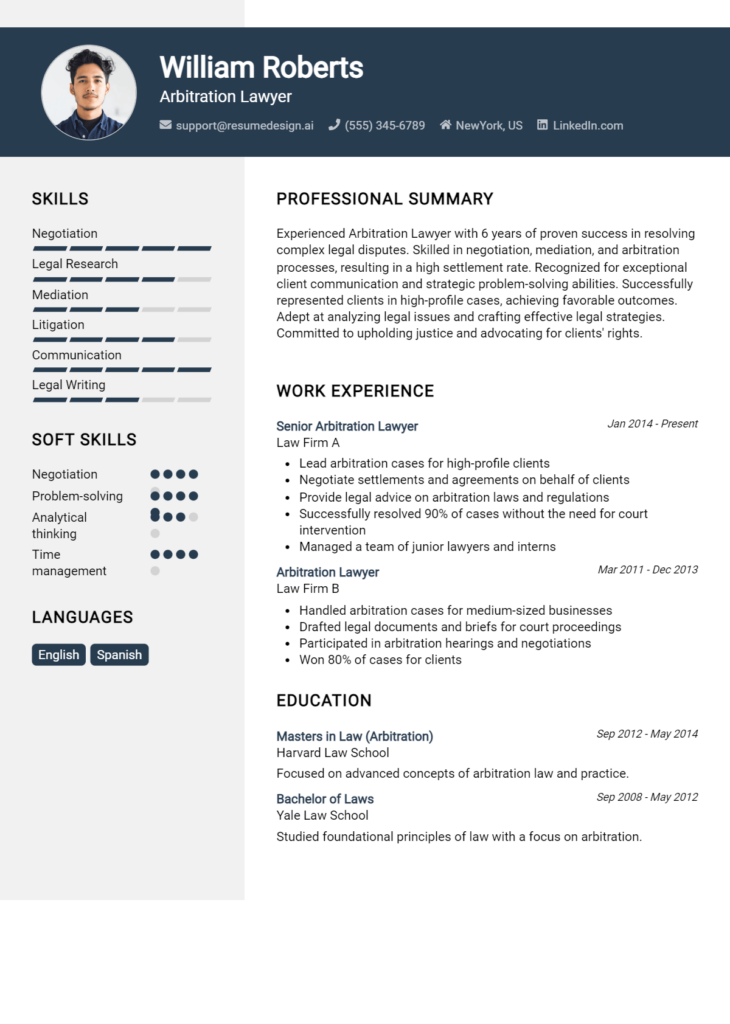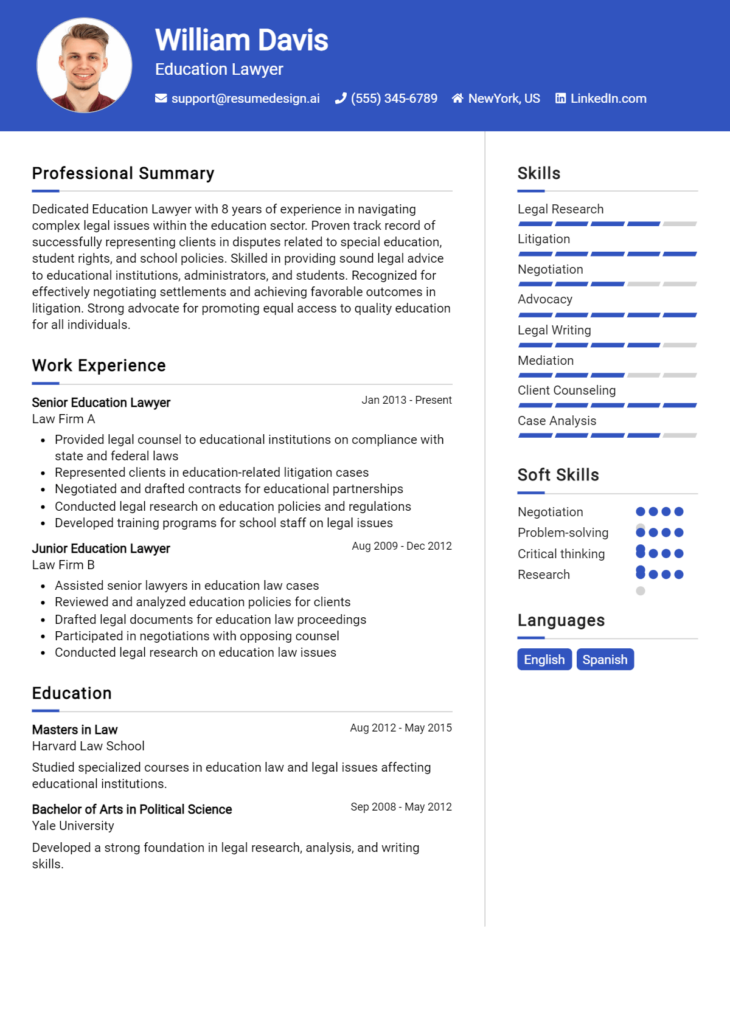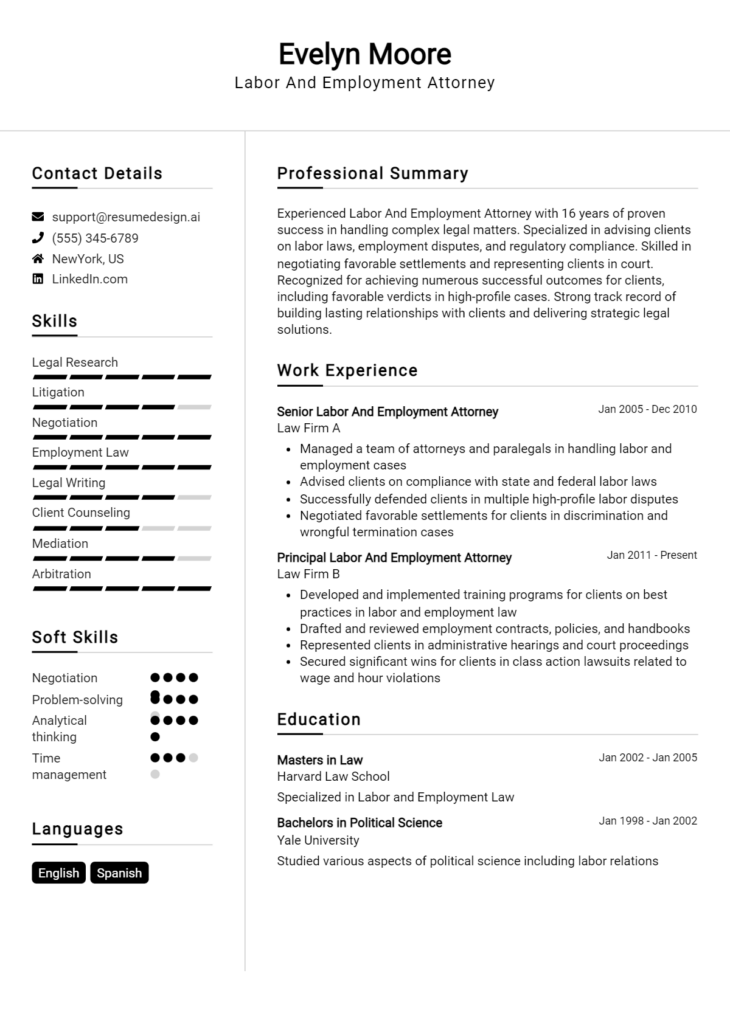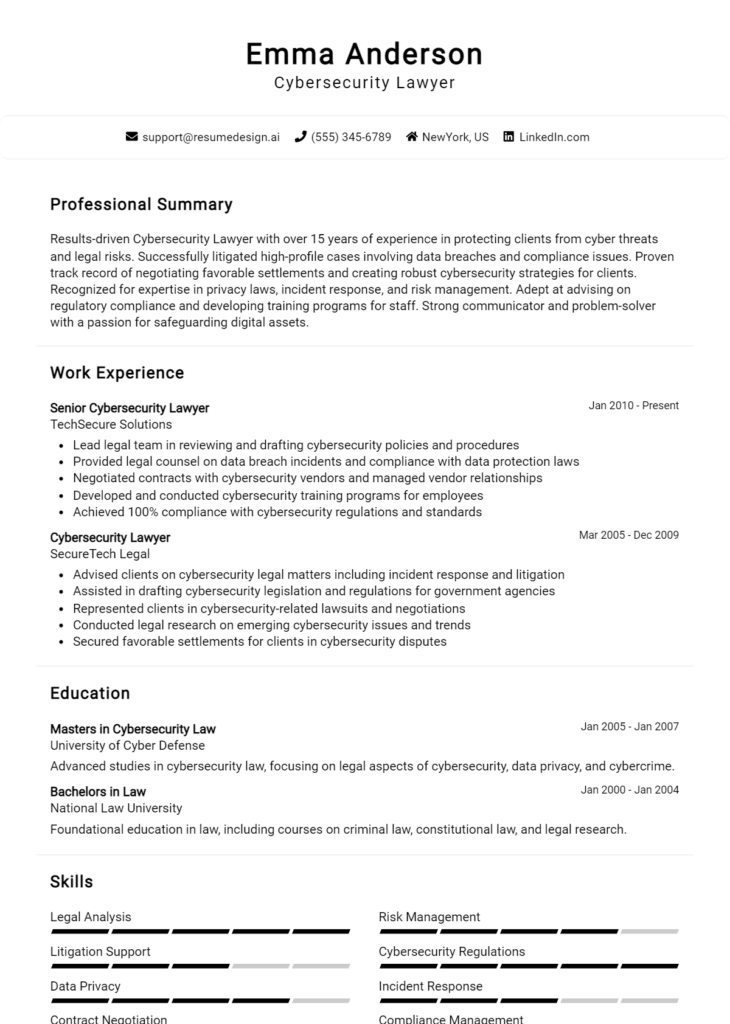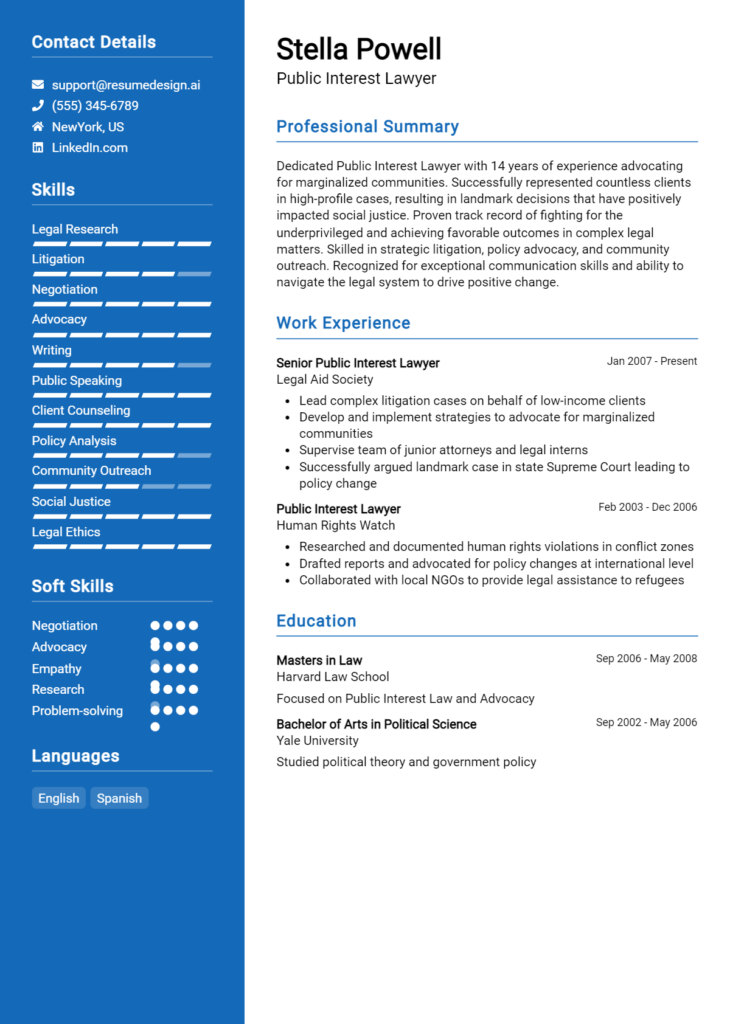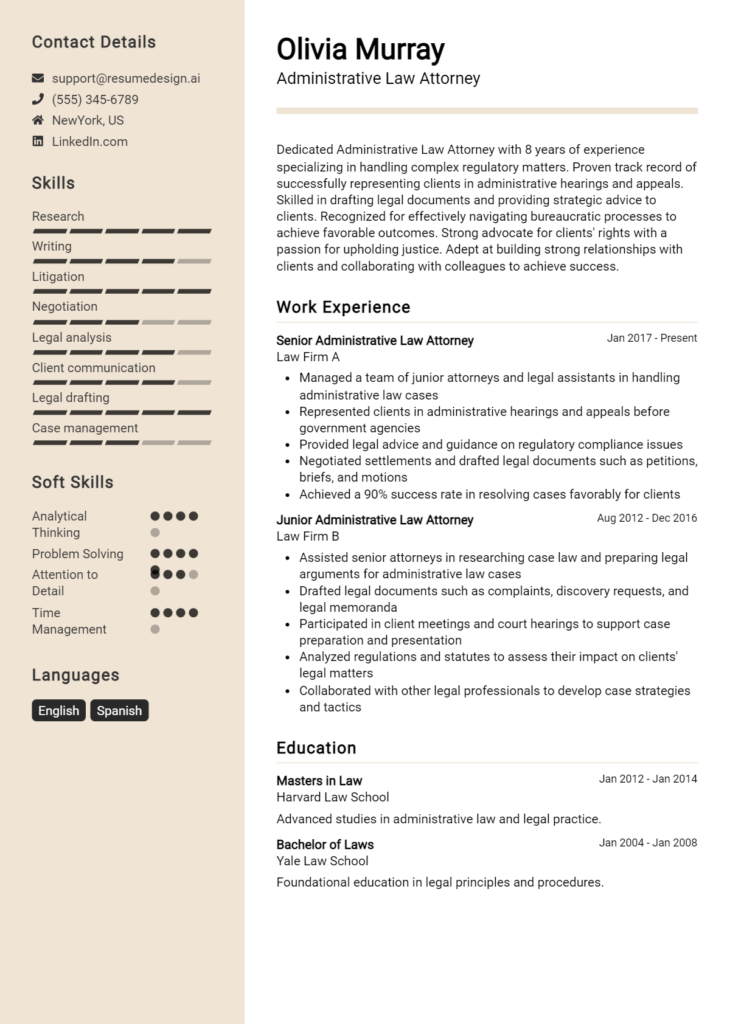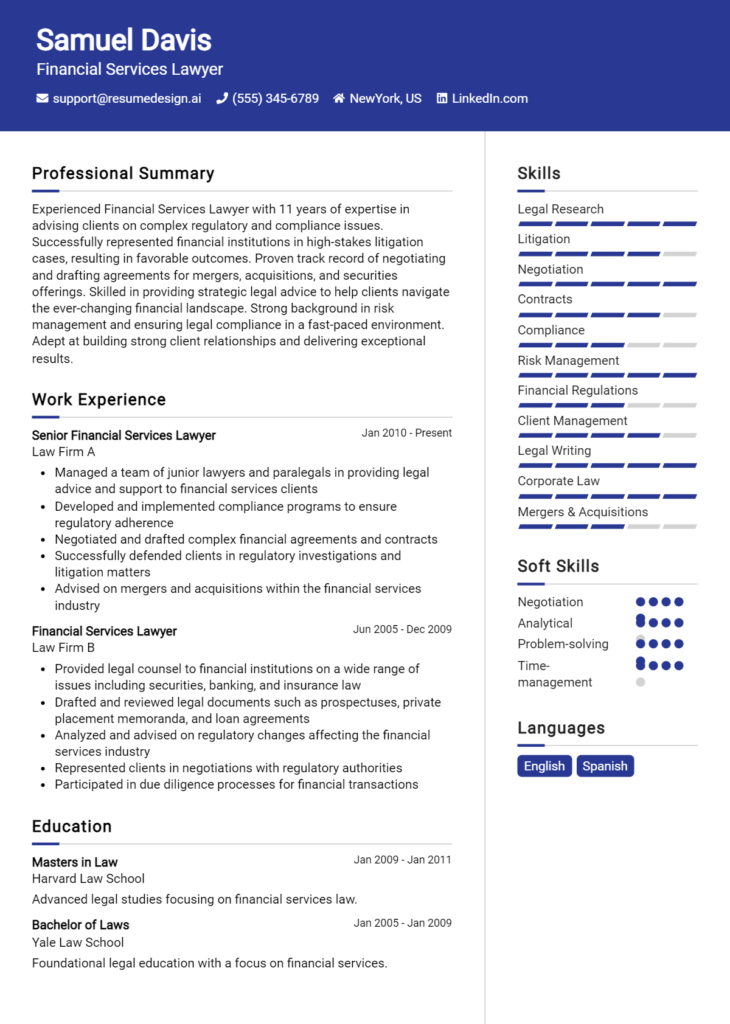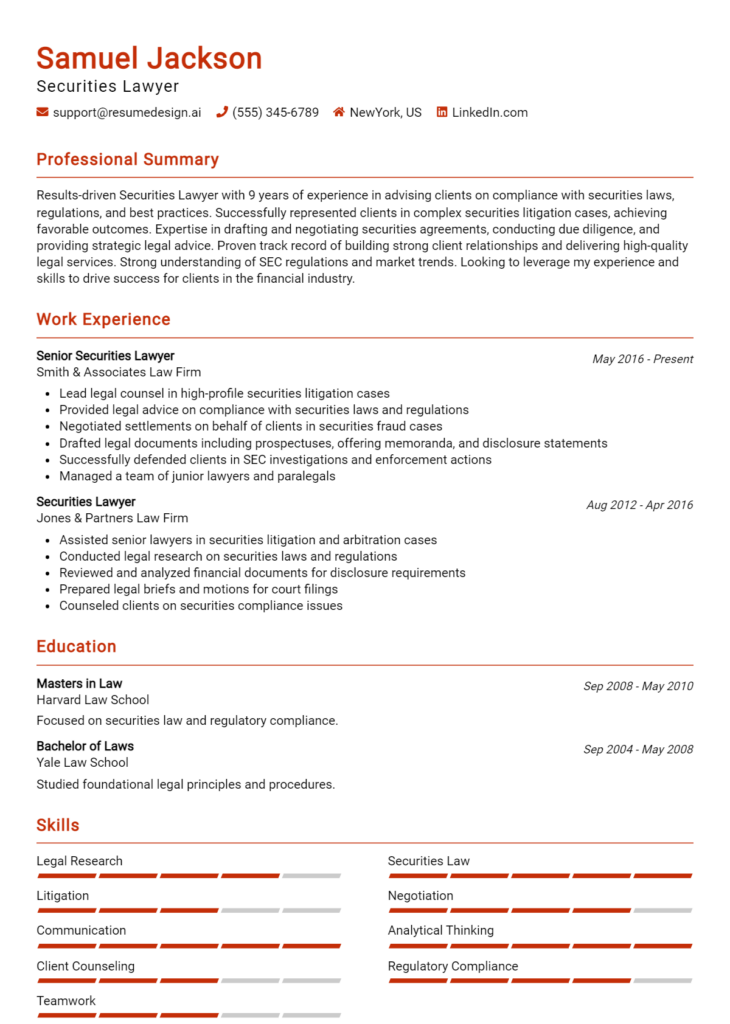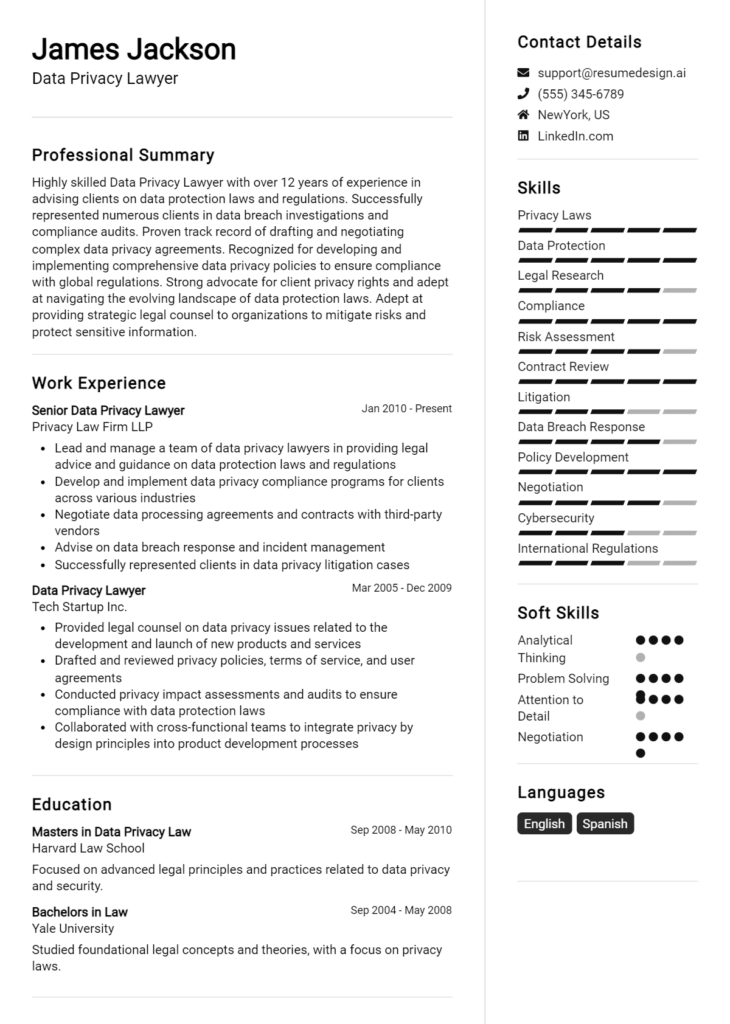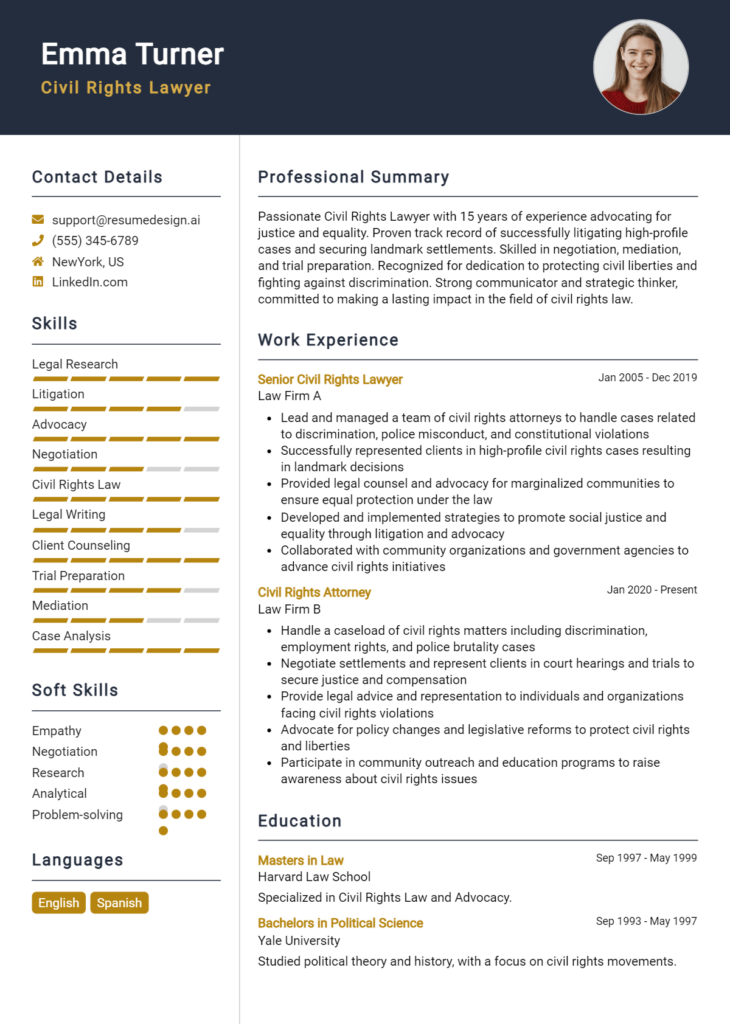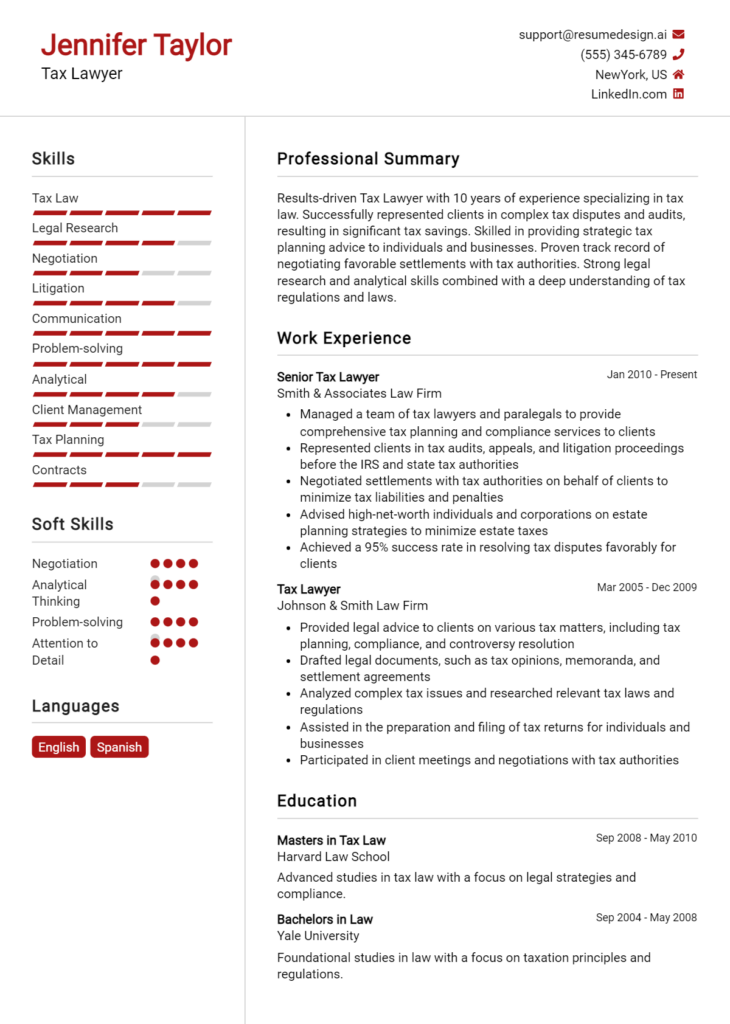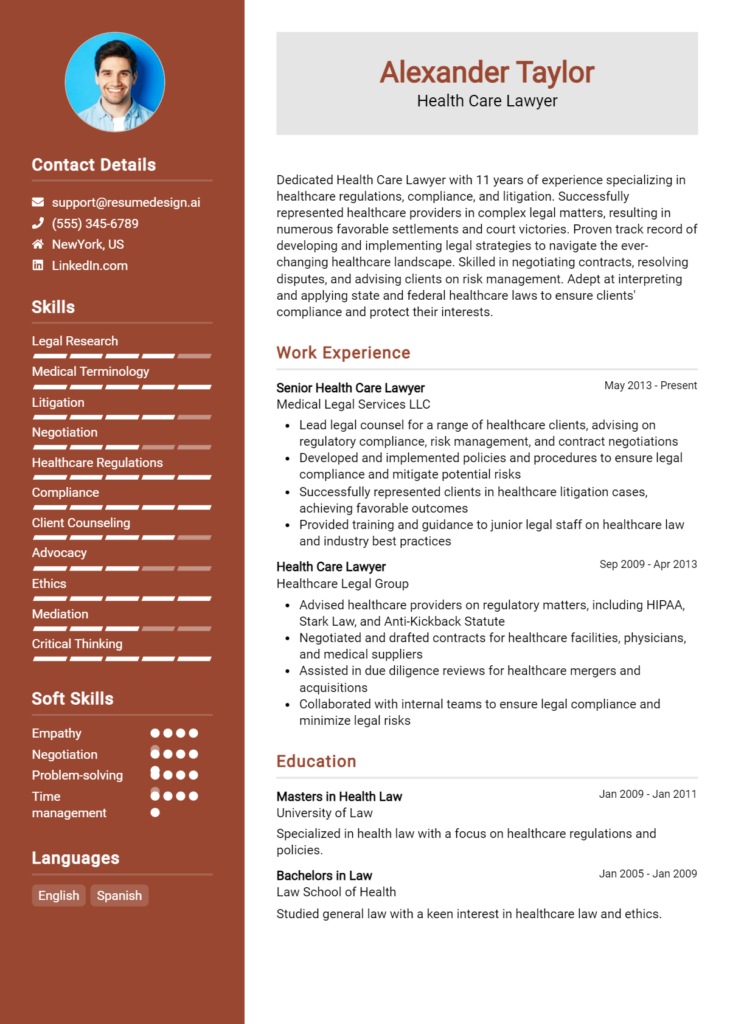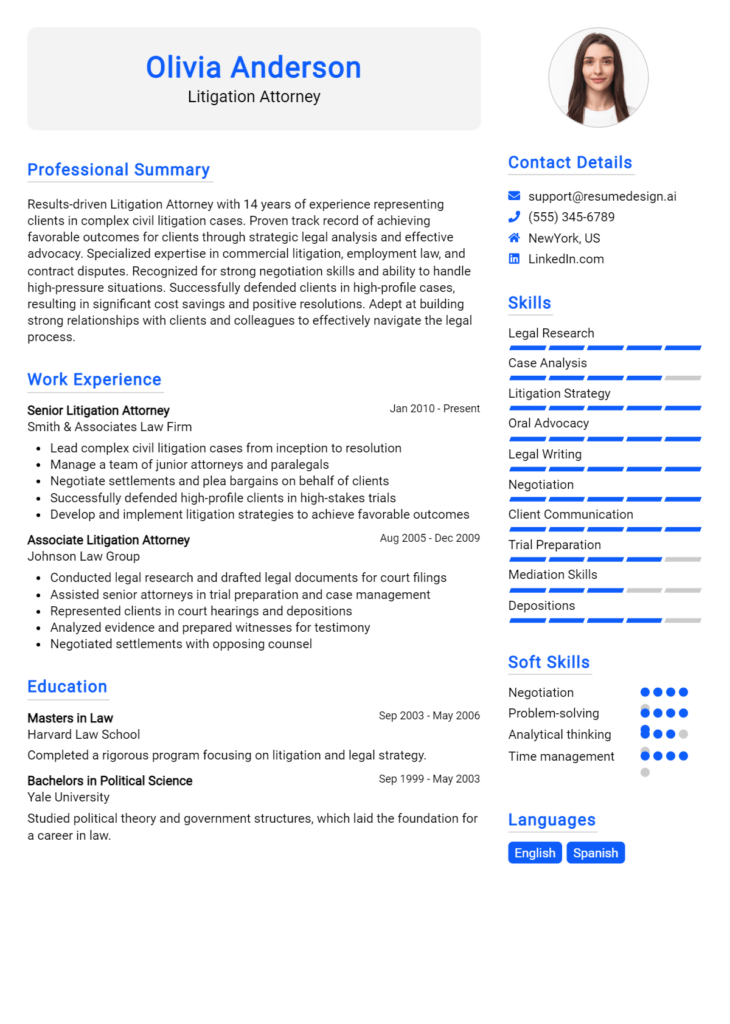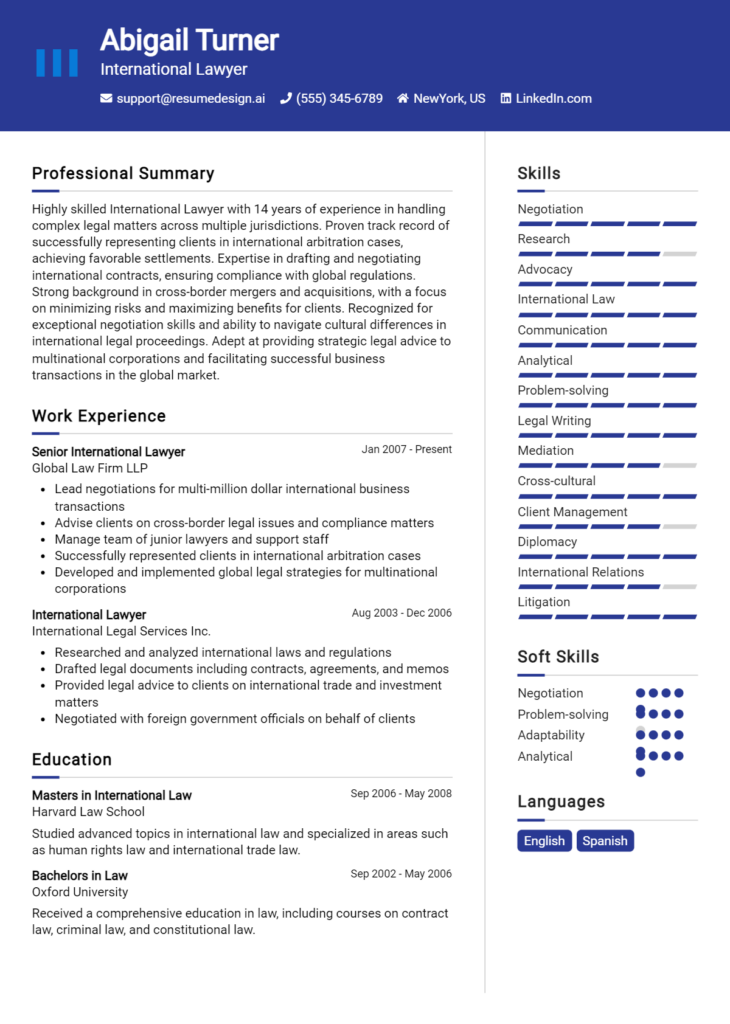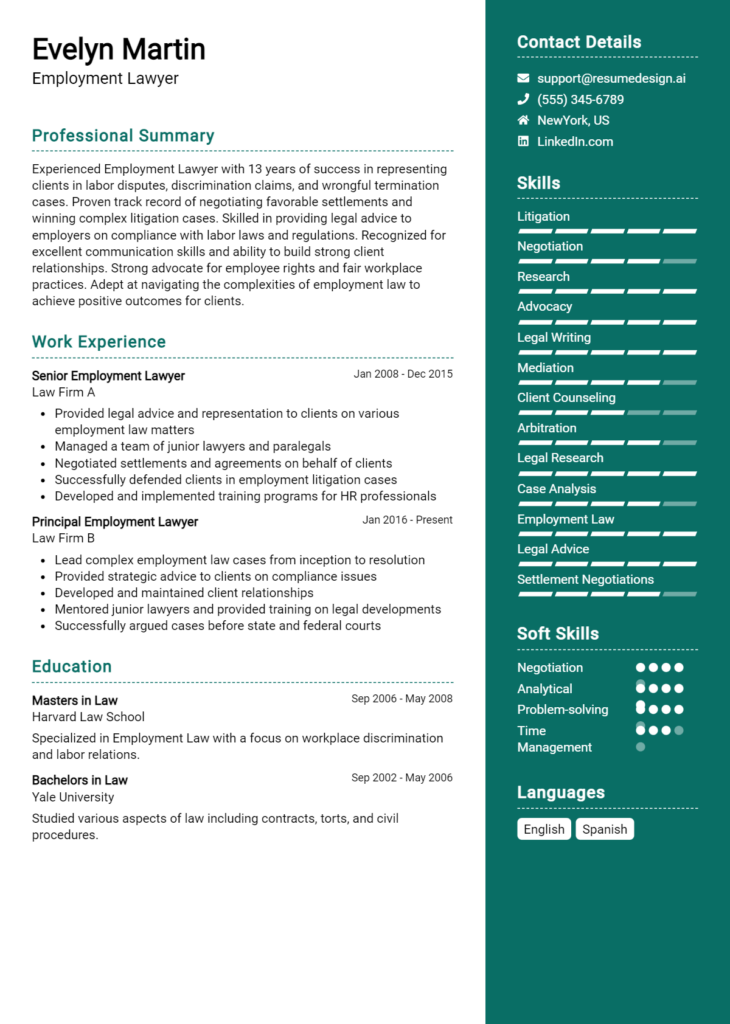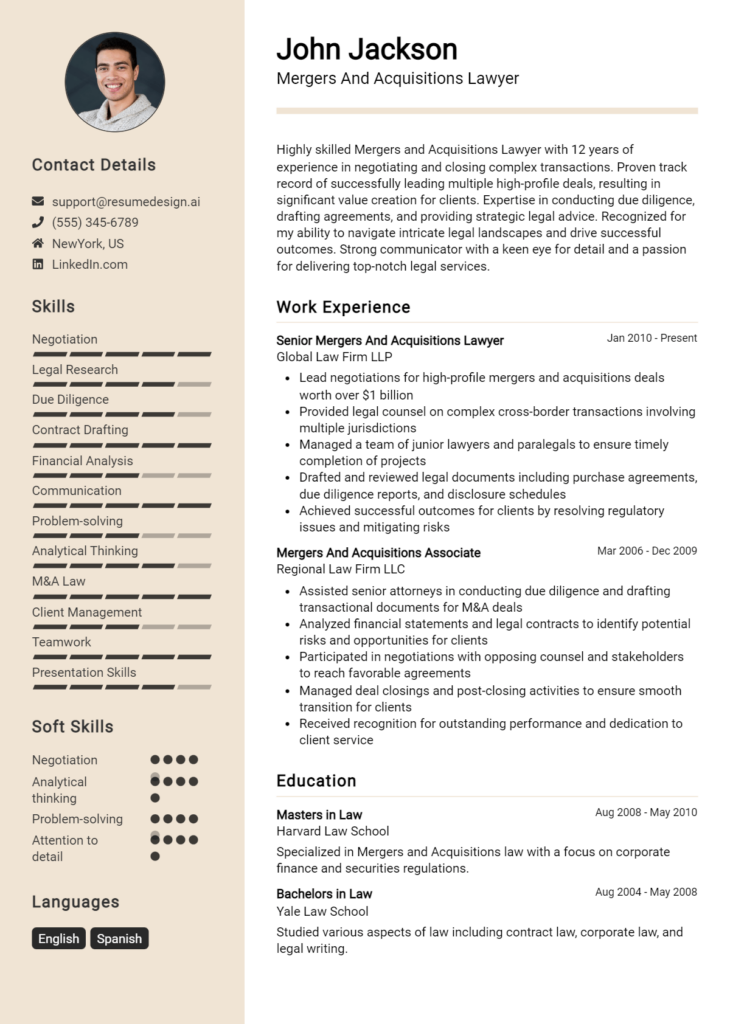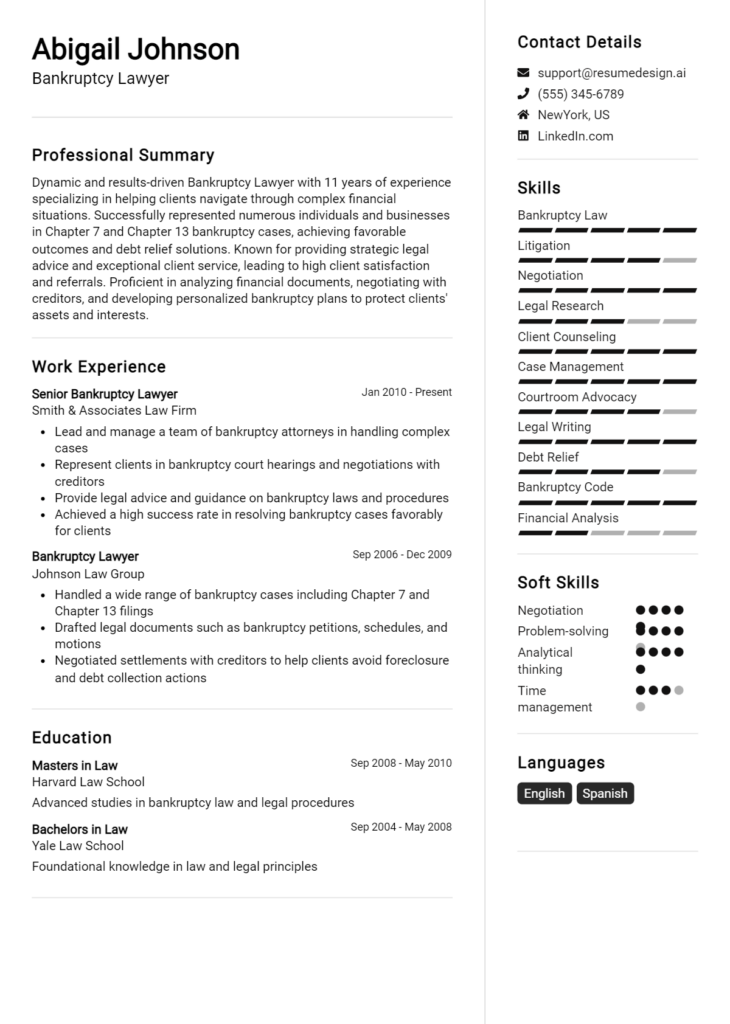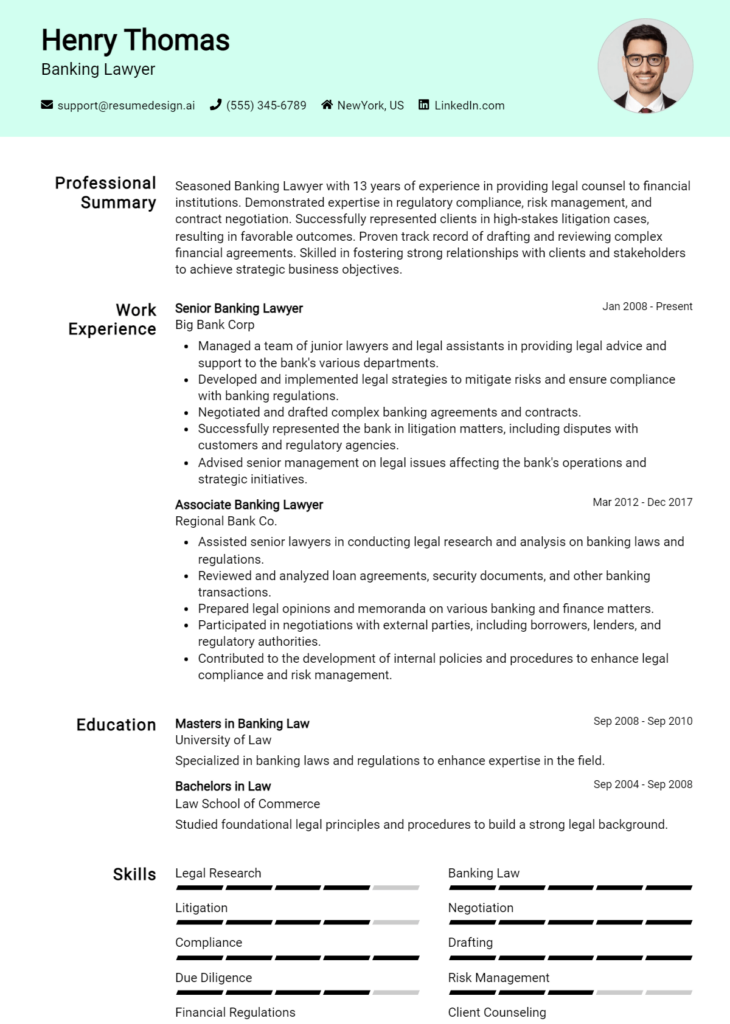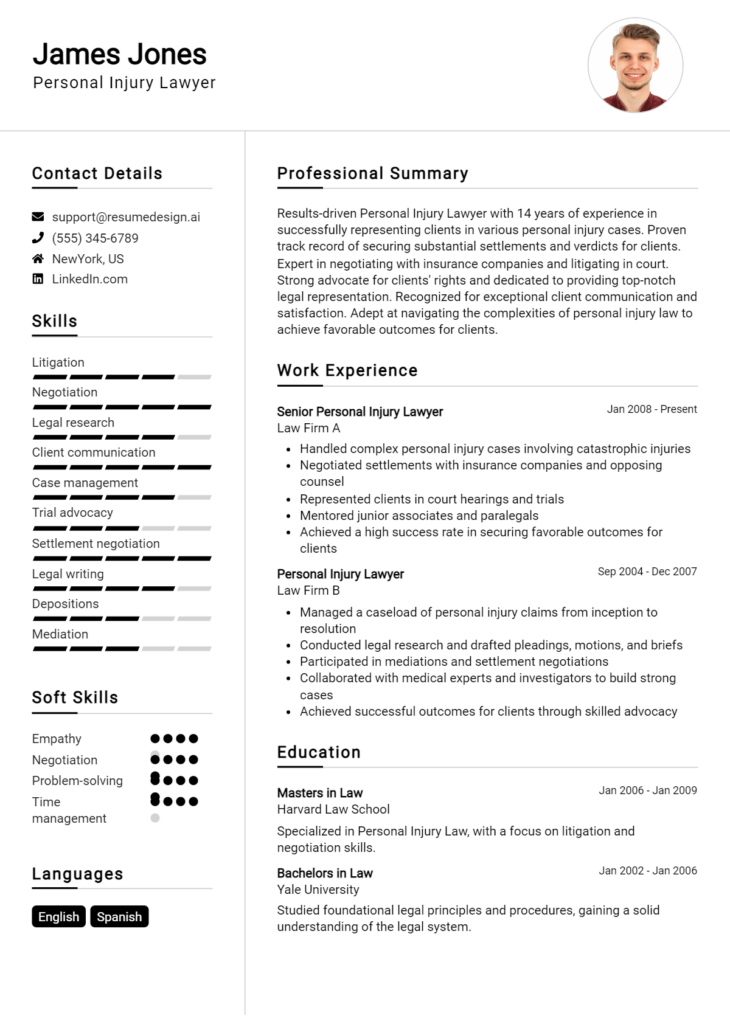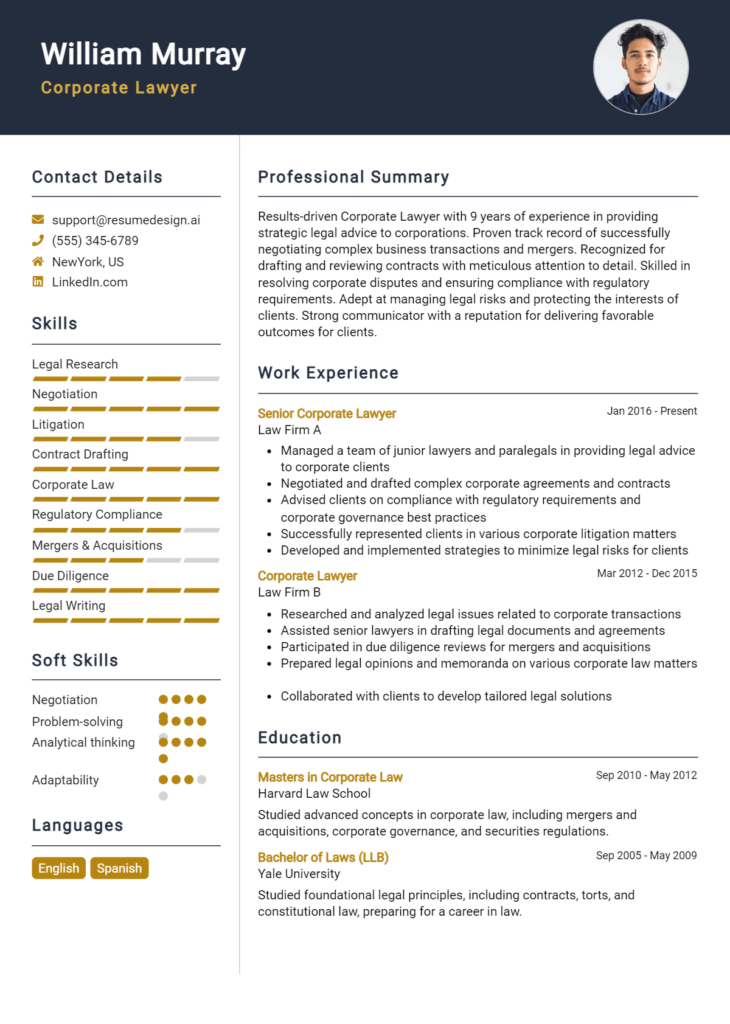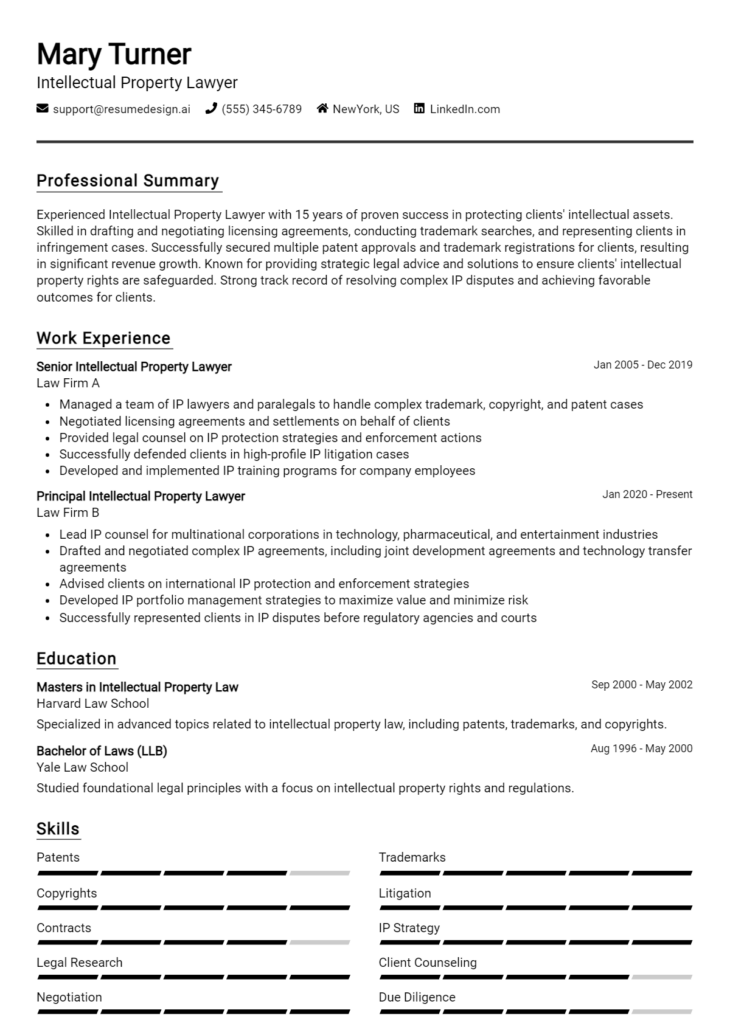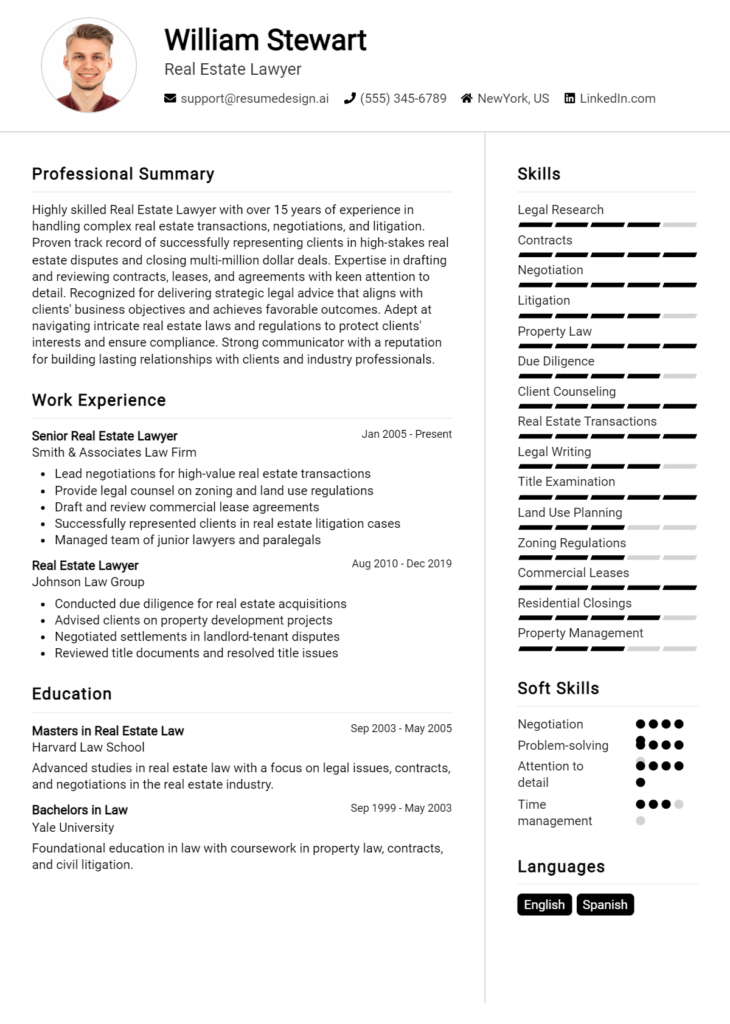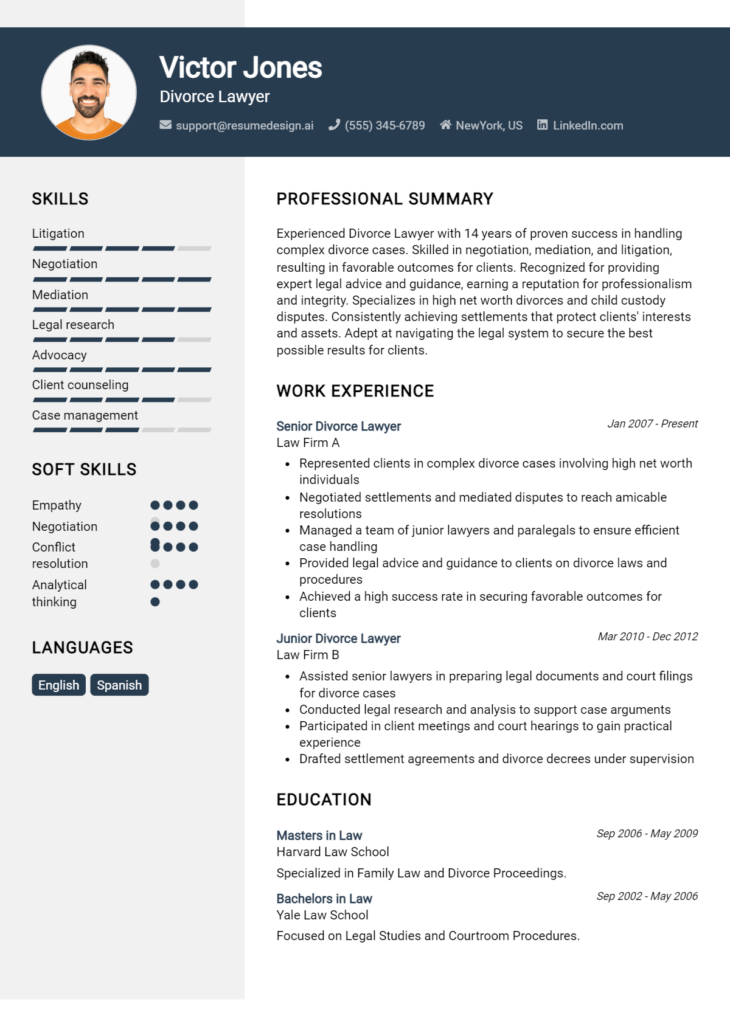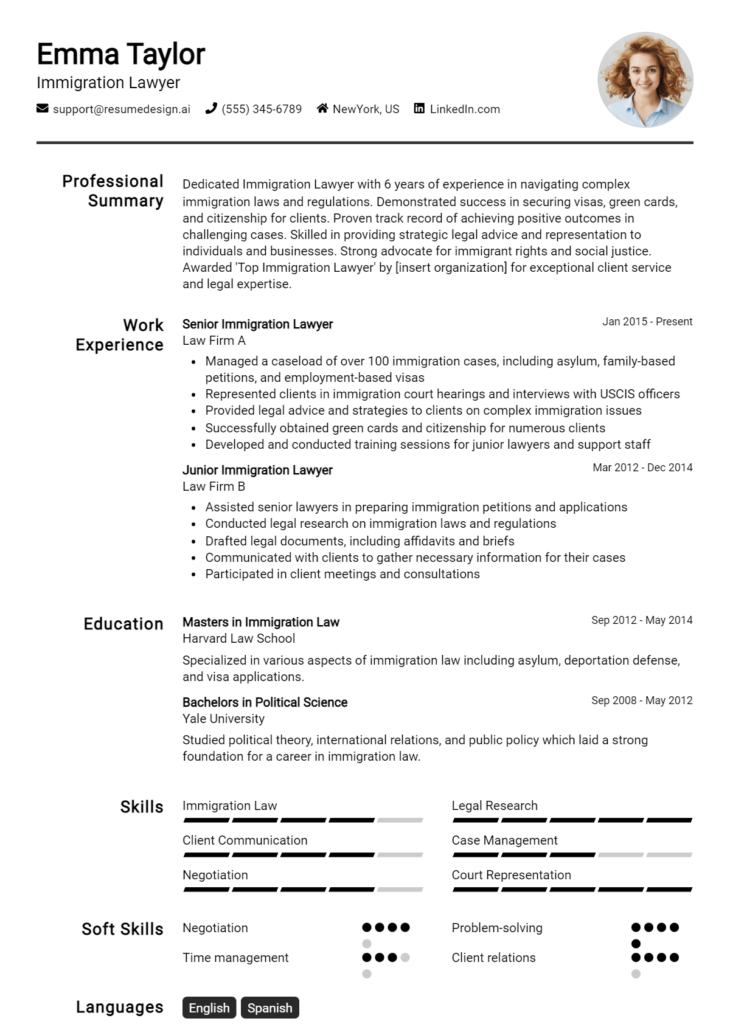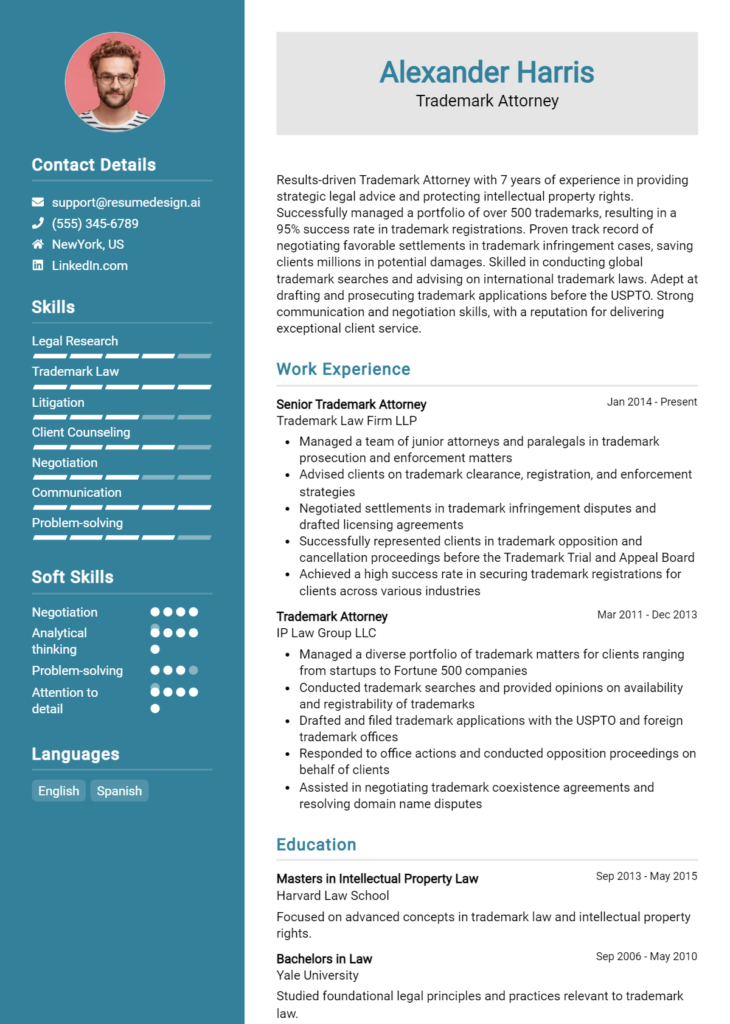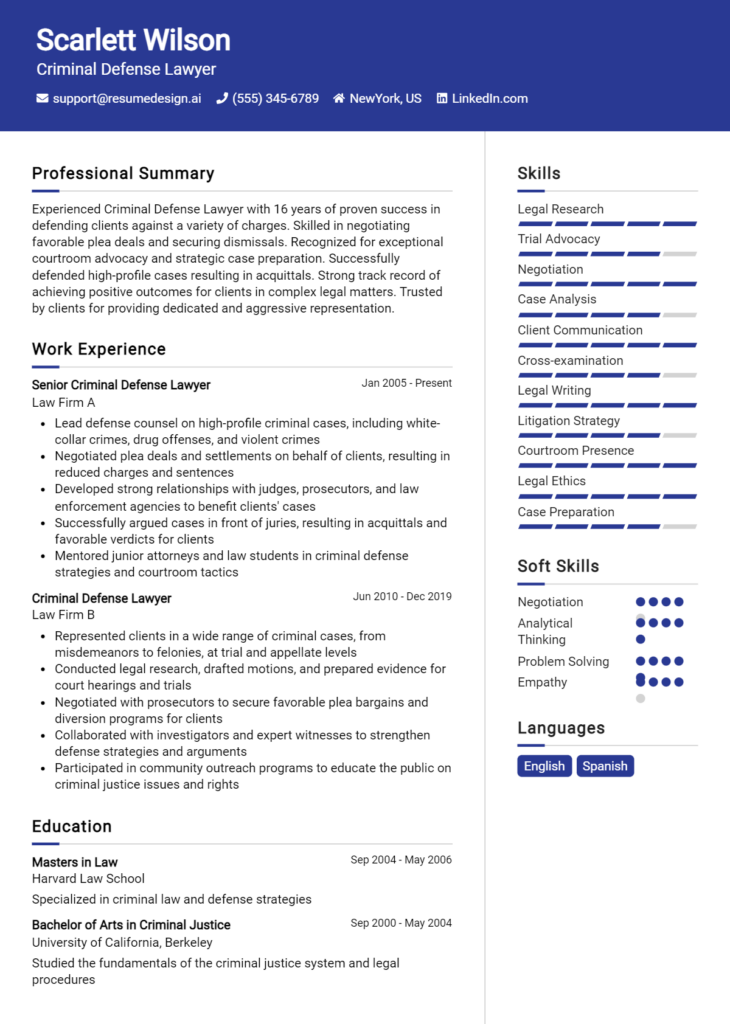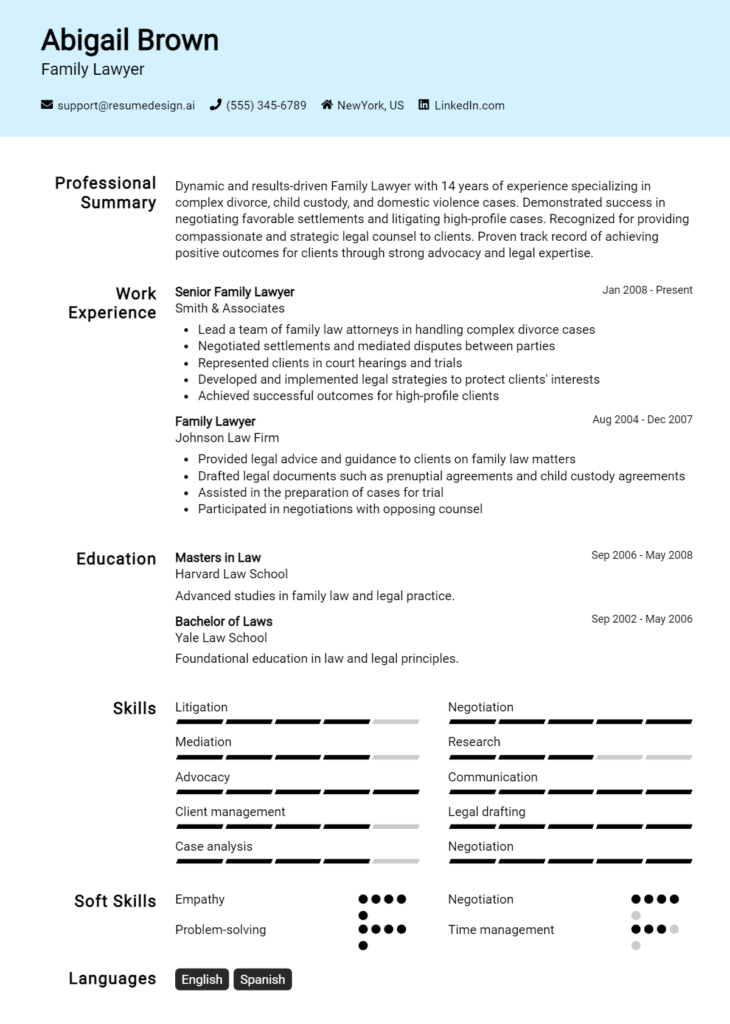Patent Attorney Core Responsibilities
A Patent Attorney plays a crucial role in safeguarding intellectual property by bridging technical, legal, and operational functions within an organization. Key responsibilities include drafting patent applications, conducting prior art searches, and advising clients on patentability and infringement issues. Essential skills encompass strong analytical abilities, attention to detail, and effective communication for collaborating across departments. Mastering these competencies not only supports innovation but also aligns with the organization’s strategic goals. A well-crafted resume effectively highlights these qualifications, enhancing career prospects.
Common Responsibilities Listed on Patent Attorney Resume
- Conducting patentability assessments and prior art searches
- Drafting and filing patent applications
- Advising clients on intellectual property rights and strategies
- Representing clients in patent prosecution before patent offices
- Negotiating and drafting licensing agreements
- Conducting infringement analyses and providing legal opinions
- Staying updated on patent law and industry trends
- Collaborating with R&D teams to identify patentable innovations
- Preparing and conducting patent litigation support
- Providing training and support on IP management
High-Level Resume Tips for Patent Attorney Professionals
In the competitive field of patent law, a well-crafted resume is essential for Patent Attorney professionals seeking to make a strong impression on potential employers. Your resume often serves as the first point of contact, and it needs to effectively communicate your unique blend of legal expertise, technical knowledge, and successful track record. A standout resume should not only highlight your skills and accomplishments but also align with the specific requirements of the position you are applying for. This guide will provide practical and actionable resume tips tailored specifically for Patent Attorney professionals to help you craft a document that showcases your qualifications and sets you apart from the competition.
Top Resume Tips for Patent Attorney Professionals
- Tailor your resume to each job description by incorporating relevant keywords and phrases that reflect the specific requirements of the position.
- Highlight your legal experience and technical background, focusing on areas such as patent prosecution, litigation, and intellectual property law.
- Quantify your achievements by including metrics, such as the number of patents filed or successfully defended, to demonstrate the impact of your work.
- Include industry-specific skills, such as knowledge of patent databases, familiarity with patent examination procedures, and proficiency in relevant software tools.
- Showcase your educational background, including degrees and certifications in law and any relevant technical fields, such as engineering or biotechnology.
- Emphasize your ability to communicate complex legal concepts to non-technical stakeholders, which is critical in the patent field.
- List any publications, presentations, or professional affiliations that highlight your expertise and commitment to the field of patent law.
- Utilize a clean, professional format that enhances readability and ensures that important information stands out to hiring managers.
- Include a summary statement at the top of your resume that encapsulates your career objectives and key qualifications in a compelling way.
By implementing these tips, you can significantly enhance your resume’s effectiveness and increase your chances of landing a job in the Patent Attorney field. A targeted and well-structured resume not only showcases your qualifications but also demonstrates your professionalism and attention to detail, qualities that are highly valued in the legal profession.
Why Resume Headlines & Titles are Important for Patent Attorney
In the competitive field of intellectual property law, a Patent Attorney's resume must stand out to capture the attention of hiring managers. A well-crafted resume headline or title serves as the first impression and can significantly influence the decision to read further. A strong headline encapsulates a candidate's key qualifications and expertise in a concise manner, offering an impactful summary that aligns with the specific requirements of the position being applied for. By highlighting relevant skills and experiences, the right headline can effectively set the tone for the rest of the resume, paving the way for the applicant to showcase their professional journey and achievements.
Best Practices for Crafting Resume Headlines for Patent Attorney
- Be concise: Keep your headline brief and to the point, ideally within 10-12 words.
- Stay role-specific: Tailor your headline to the specific Patent Attorney position you are applying for.
- Highlight key qualifications: Include essential skills or experiences that are directly relevant to patent law.
- Use strong action words: Start with impactful verbs that convey your abilities and achievements.
- Incorporate industry keywords: Utilize relevant terms that hiring managers might be searching for.
- Avoid jargon: Use clear language that is easily understood and avoids unnecessary complexity.
- Showcase unique strengths: Highlight what sets you apart from other candidates in the field.
- Align with the job description: Reflect the language and requirements found in the job listing.
Example Resume Headlines for Patent Attorney
Strong Resume Headlines
"Experienced Patent Attorney with a Track Record of Successful Filings"
“Innovative Patent Strategist Specializing in Biotechnology and IP Management”
“Results-Driven Patent Attorney with 10+ Years in High-Stakes Litigation”
“Skilled Patent Attorney Focused on Electrical Engineering and Patent Prosecution”
Weak Resume Headlines
“Patent Attorney Looking for Opportunities”
“Legal Professional with Experience”
The strong headlines are effective because they are specific, convey a clear value proposition, and immediately communicate relevant expertise to potential employers. They utilize industry-relevant terminology and quantify experience, making them impactful and memorable. In contrast, the weak headlines fail to impress due to their vagueness and lack of detail; they do not highlight any unique strengths or qualifications, making it difficult for hiring managers to see the candidate's potential fit for the position. By avoiding generic phrases, candidates can better position themselves as valuable assets in the field of patent law.
Writing an Exceptional Patent Attorney Resume Summary
A well-crafted resume summary is crucial for Patent Attorneys as it serves as the first impression a hiring manager will have of a candidate. A strong summary quickly captures attention by highlighting key skills, relevant experience, and notable accomplishments that align with the job role. In a competitive field, where technical expertise and legal knowledge are paramount, an impactful summary should be concise yet compelling, tailored specifically to the job being applied for. This strategic approach not only showcases the candidate's qualifications but also demonstrates their understanding of the position's requirements.
Best Practices for Writing a Patent Attorney Resume Summary
- Quantify Achievements: Use numbers to illustrate the impact of your work, such as the number of patents filed or successfully granted.
- Focus on Relevant Skills: Highlight specific skills pertinent to patent law, such as legal research, drafting applications, and client consultation.
- Tailor for the Job Description: Customize your summary to reflect the qualifications and experiences that the job listing emphasizes.
- Use Action Verbs: Start sentences with strong action verbs to convey confidence and proactivity.
- Keep it Concise: Aim for 2-4 sentences that capture the essence of your professional identity without overwhelming details.
- Showcase Industry Expertise: Mention your familiarity with specific technologies or industries to demonstrate your niche knowledge.
- Highlight Soft Skills: Emphasize qualities such as communication, negotiation, and analytical thinking that are valuable in patent law.
- Include Professional Designations: If applicable, mention any relevant certifications, such as being a registered patent attorney.
Example Patent Attorney Resume Summaries
Strong Resume Summaries
Dynamic Patent Attorney with over 10 years of experience in intellectual property law, successfully securing 150+ patents for clients in the technology sector. Proven ability to conduct thorough patent searches and provide expert legal counsel, resulting in a 95% approval rate on applications.
Detail-oriented Patent Attorney specializing in biotechnology, with a track record of drafting and prosecuting over 200 patent applications. Recognized for enhancing clients’ IP portfolios, contributing to a 30% increase in revenue through effective patent strategy development.
Results-driven Patent Attorney with extensive experience in negotiating licensing agreements and managing IP litigation. Successfully defended 10+ patent infringement cases, achieving favorable settlements and reducing client liabilities by an average of 40%.
Weak Resume Summaries
Experienced attorney with a background in patents and intellectual property. Good at working with clients and understanding their needs.
Patent Attorney with various skills and a general understanding of patent law. Seeking opportunities to apply my knowledge in a new position.
The strong resume summaries are considered effective because they are specific, highlight quantifiable achievements, and directly relate to the responsibilities and skills required for the role of a Patent Attorney. They showcase a clear understanding of the job and provide concrete examples of the candidates' contributions. In contrast, the weak summaries lack detail, do not provide measurable outcomes, and appear too generic, failing to capture the unique qualifications that would set the candidate apart in a competitive job market.
Work Experience Section for Patent Attorney Resume
The work experience section of a Patent Attorney resume is crucial as it serves as a window into the candidate's professional journey, showcasing their technical skills, leadership capabilities, and commitment to delivering high-quality outcomes. This section highlights not only the candidate's legal expertise but also their ability to manage teams, navigate complex patent landscapes, and achieve measurable results. By quantifying achievements and aligning experiences with industry standards, candidates can demonstrate their value to potential employers and stand out in a competitive job market.
Best Practices for Patent Attorney Work Experience
- Clearly articulate your role in each project and specify your contributions.
- Quantify achievements with metrics such as the number of patents filed or success rates in litigation.
- Highlight collaboration with cross-functional teams, showcasing your ability to work effectively with engineers, scientists, and business professionals.
- Use industry-specific terminology to demonstrate your technical expertise and familiarity with patent laws.
- Focus on results-driven descriptions—emphasize how your efforts directly benefited clients or your firm.
- Tailor your experience to align with the specific requirements of the job you are applying for.
- Include any leadership roles or mentoring experiences that demonstrate your ability to guide and develop junior attorneys or interns.
- Keep descriptions concise yet informative, ensuring clarity and focus on key achievements.
Example Work Experiences for Patent Attorney
Strong Experiences
- Successfully led a team of 5 attorneys in filing over 150 patents in the biotech sector, resulting in a 30% increase in patent grants year-over-year.
- Managed a multi-million dollar patent litigation case that resulted in a favorable settlement, saving the client 40% in potential litigation costs.
- Coordinated cross-departmental efforts to streamline patent application processes, reducing turnaround time by 25% while maintaining compliance with legal standards.
- Mentored junior patent attorneys, enhancing team performance and contributing to a 50% increase in successful patent filings within the department.
Weak Experiences
- Assisted with patent applications.
- Worked on various legal matters.
- Helped in meetings and discussions.
- Participated in team projects.
The examples provided illustrate the distinction between strong and weak experiences. Strong experiences are characterized by clear, quantifiable outcomes and specific contributions that demonstrate leadership and collaboration, thereby showcasing the candidate’s expertise. In contrast, weak experiences lack detail and specificity, making it difficult for potential employers to understand the candidate's role or the impact of their work, ultimately failing to convey their value effectively.
Education and Certifications Section for Patent Attorney Resume
The education and certifications section of a Patent Attorney resume is a crucial component that showcases the candidate's academic achievements, relevant certifications, and commitment to ongoing professional development. This section not only highlights qualifications that align with the demands of the role but also demonstrates the candidate's expertise in intellectual property law and related fields. By including relevant coursework, recognized certifications, and specialized training, candidates can significantly enhance their credibility and show potential employers their dedication to staying current in an ever-evolving legal landscape.
Best Practices for Patent Attorney Education and Certifications
- Prioritize relevant degrees, such as a Juris Doctor (JD) or a Master’s in Intellectual Property Law.
- Include industry-recognized certifications, such as Registered Patent Attorney or certifications from reputable organizations like the USPTO.
- Highlight specialized training or continuing education courses that pertain to patent law, IP strategy, or technology trends.
- Detail any relevant coursework that demonstrates a comprehensive understanding of patent law, technology, and science.
- Use clear headings and bullet points for readability, making it easy for hiring managers to identify key qualifications.
- Keep the section concise, focusing on the most pertinent information to the patent attorney role.
- Update the section regularly to reflect new certifications, courses, or relevant educational experiences.
- Consider adding honors or awards received during education that may further validate expertise and commitment.
Example Education and Certifications for Patent Attorney
Strong Examples
- Juris Doctor (JD) - Harvard Law School, 2015
- Registered Patent Attorney - United States Patent and Trademark Office (USPTO), 2016
- Master of Science in Electrical Engineering - Stanford University, 2012
- Certificate in Intellectual Property Management - American Intellectual Property Law Association, 2019
Weak Examples
- Bachelor of Arts in History - University of California, 2008
- Certification in Basic Computer Skills - Online Course, 2020
- Diploma in Office Administration - Community College, 2010
- High School Diploma - Anytown High School, 2004
The strong examples are considered robust because they reflect advanced degrees, relevant certifications, and specialized training that align closely with the expectations of a Patent Attorney role. They demonstrate not only the candidate’s legal knowledge but also their technical expertise, making them highly credible. Conversely, the weak examples lack relevance to the field of patent law, featuring outdated or unrelated qualifications that do not enhance the candidate's suitability for a patent attorney position.
Top Skills & Keywords for Patent Attorney Resume
As a Patent Attorney, showcasing the right skills on your resume is crucial for standing out in a competitive legal landscape. These skills not only highlight your technical expertise and legal knowledge but also demonstrate your ability to navigate complex intellectual property issues. A well-crafted resume that emphasizes relevant skills can significantly increase your chances of landing an interview. By focusing on both hard and soft skills, you can present a comprehensive picture of your capabilities, making you an attractive candidate to potential employers.
Top Hard & Soft Skills for Patent Attorney
Soft Skills
- Strong communication skills
- Analytical thinking
- Attention to detail
- Problem-solving abilities
- Negotiation skills
- Time management
- Client relationship management
- Team collaboration
- Adaptability
- Research proficiency
Hard Skills
- Patent law knowledge
- Intellectual property rights expertise
- Drafting patent applications
- Conducting patent searches
- Patent litigation experience
- Trademark law understanding
- Regulatory compliance knowledge
- Technical writing
- Proficiency in patent databases
- Familiarity with international patent laws
Highlighting these skills in your resume, along with your work experience, will not only enhance your profile but also position you as a well-rounded candidate ready to tackle the challenges in the field of patent law.
Stand Out with a Winning Patent Attorney Cover Letter
Dear [Hiring Manager's Name],
I am writing to express my interest in the Patent Attorney position at [Company Name], as advertised on [where you found the job listing]. With a Juris Doctor degree from [Your Law School] and over [X years] of experience in intellectual property law, I am excited about the opportunity to contribute my expertise in patent prosecution and litigation to your esteemed firm. My comprehensive understanding of patent law, combined with my strong technical background in [specific technical fields, e.g., biotechnology, software, engineering], enables me to effectively navigate complex legal challenges and provide clients with strategic guidance in protecting their innovations.
Throughout my career, I have successfully managed a diverse portfolio of patent applications, from initial filings to post-grant proceedings. At my previous position with [Previous Company Name], I led a team that drafted and prosecuted over [number] patents, achieving a [percentage]% success rate in securing patents. My ability to communicate complex technical concepts clearly and persuasively has been instrumental in my success, allowing me to advocate effectively for clients in both written and oral proceedings. I am particularly proud of my role in [specific project or case], which resulted in a favorable outcome that significantly advanced our client’s business interests.
I am drawn to [Company Name] because of its reputation for innovation and commitment to excellence in the field of intellectual property. I am eager to bring my skills in patent strategy and client relations to your team, helping to ensure your clients' intellectual property is robustly protected. I am enthusiastic about the possibility of contributing to your firm’s success and to the innovative projects that your clients are pursuing.
Thank you for considering my application. I look forward to the opportunity to discuss how my background and skills align with the needs of your team. Please feel free to contact me at [Your Phone Number] or [Your Email Address] to schedule a conversation.
Sincerely,
[Your Name]
[Your LinkedIn Profile] (if applicable)
[Your Address]
Common Mistakes to Avoid in a Patent Attorney Resume
When crafting a resume as a Patent Attorney, it’s crucial to avoid common pitfalls that could hinder your chances of landing an interview. A well-structured resume should highlight your legal expertise, technical knowledge, and experience in intellectual property law. However, many candidates make avoidable mistakes that detract from their qualifications. Below are several common errors to watch out for:
Vague Language: Using generic phrases or buzzwords can obscure your specific skills and achievements. Be precise about your contributions and the impact of your work.
Ignoring Tailoring: Failing to customize your resume for each job application can make it seem like you’re not genuinely interested in the position. Tailor your resume to reflect the unique requirements of each employer.
Overloading with Jargon: While technical knowledge is essential, overusing industry jargon can alienate non-specialist readers. Strive for a balance between technical terms and clear explanations.
Neglecting Results: Listing responsibilities without highlighting your accomplishments can make your experience seem less impactful. Quantify your achievements whenever possible to demonstrate your effectiveness.
Poor Formatting: A cluttered or difficult-to-read resume can distract from your qualifications. Use clear headings, bullet points, and consistent formatting to enhance readability.
Omitting Relevant Experience: Failing to include internships, clerkships, or relevant work in related fields can weaken your application. Ensure you showcase all applicable experiences that highlight your proficiency in patent law.
List of Duties Instead of Skills: Simply listing duties can make your resume read like a job description. Instead, focus on the skills you've developed and how they apply to the role of a Patent Attorney.
Ignoring the Importance of Soft Skills: While technical skills are vital, overlooking soft skills such as communication, negotiation, and teamwork can result in an incomplete representation of your capabilities. Highlighting these skills can demonstrate your well-roundedness as a candidate.
Conclusion
In conclusion, becoming a successful Patent Attorney requires a blend of legal expertise, technical knowledge, and strong communication skills. This article has highlighted the importance of understanding intellectual property laws, conducting thorough patent searches, and effectively drafting patent applications. Additionally, networking within the legal and technical communities can significantly enhance career opportunities.
As you reflect on your journey towards a career in patent law, it's crucial to ensure your resume showcases your unique qualifications and experiences. An impressive resume can make all the difference in landing your desired position.
We encourage you to take a moment to review your Patent Attorney Resume. To assist you in this process, consider utilizing valuable resources such as resume templates, which provide a structured format to present your skills effectively. You can also explore the resume builder for a personalized touch, ensuring your resume stands out to potential employers. Additionally, looking at resume examples can inspire you to highlight your accomplishments creatively. Don’t forget to complement your resume with a strong application; check out our cover letter templates to make a lasting impression.
Take action today—revamp your resume and cover letter with these tools, and set yourself on the path to a rewarding career as a Patent Attorney!

